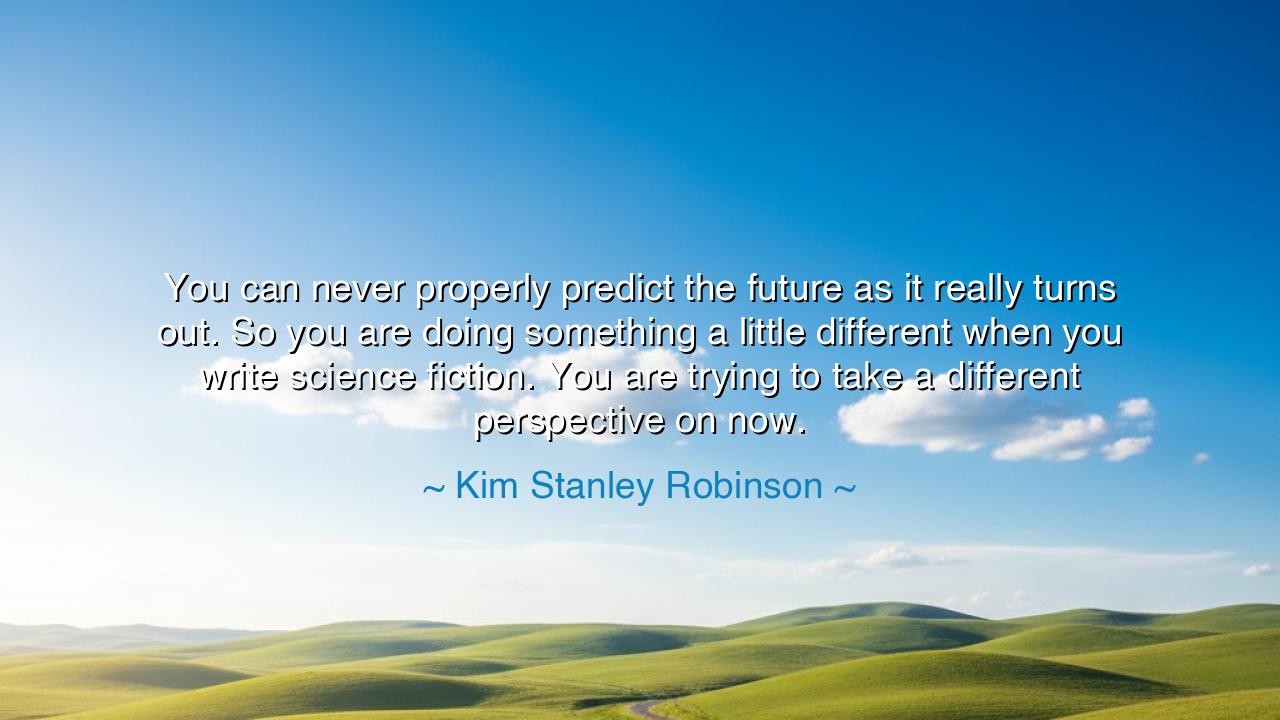
You can never properly predict the future as it really turns out.
You can never properly predict the future as it really turns out. So you are doing something a little different when you write science fiction. You are trying to take a different perspective on now.






"You can never properly predict the future as it really turns out. So you are doing something a little different when you write science fiction. You are trying to take a different perspective on now." These words by Kim Stanley Robinson encapsulate the core challenge of predicting the future. While many have tried throughout history to foretell what is to come, the future is as elusive and unpredictable as the winds themselves. What Robinson reveals, however, is that the task of writing science fiction is not about crafting exact predictions, but about reimagining the present, offering us a unique perspective that allows us to see our current world through a new lens. It is not a direct gaze into the future but a reflection of our choices, our values, and the consequences that stem from them.
In the ancient world, the idea of predicting the future was both revered and feared. The Oracle of Delphi was a central figure in Greek society, believed to hold the power to reveal the future through cryptic prophecies. Yet, these oracles did not provide clear answers; rather, they offered riddles and glimpses of what might come—often leaving those who sought their wisdom to interpret the meaning. Even the greatest philosophers, like Socrates, understood that the future was something that could not be precisely known. Socrates famously declared, “I know that I know nothing,” acknowledging the limitations of human knowledge. Ancient seers often understood that the future is shaped not by certainty, but by chance, choice, and interpretation. In this way, Robinson’s view mirrors the ancient understanding that what is to come is not a fixed path but an unfolding tapestry of possibilities.
Robinson’s concept of science fiction also echoes ancient traditions of storytelling and myth. In the Greek epics, such as those written by Homer, heroes like Achilles and Odysseus faced fates that were partially shaped by their choices and the will of the gods. These stories were not just entertainment; they were ways of exploring human nature and moral dilemmas. The characters in these epics wrestled with their understanding of the future—whether it was the knowledge of their eventual fate or their struggle to forge their own destiny. Just as Homer used myth to illuminate the struggles of the present, science fiction uses the future to explore the possibilities of now, offering a vision of what might be if humanity continues on its current path.
In the modern world, science fiction serves a similar function, offering a mirror to our contemporary struggles. Consider the works of George Orwell, whose 1984 painted a chilling future shaped by totalitarianism and loss of personal freedoms. While Orwell’s vision of the future was a cautionary tale, it was grounded in the concerns and fears of his time. Through his fiction, Orwell was not merely predicting a future dictatorship, but warning of the dangerous tendencies of the present. In this way, science fiction becomes a vehicle for critique, allowing authors like Robinson to engage with the challenges of our world by taking a step back and imagining different paths forward.
Robinson’s quote also underscores the significance of perspective. Writing science fiction is not about predicting specific events, but about offering new viewpoints on the choices we make today. It’s a call to see the world differently, to understand that the future is shaped by the present moment. In this sense, the writer of science fiction does not merely craft tales of alien worlds or distant futures; they challenge readers to reflect on the world as it is now and to ask, “How might it evolve? What are the possibilities if we continue down this path?” Through these stories, we are invited to confront our own reality and the paths we are creating with every choice we make.
The lesson Robinson imparts is clear: the future is not something set in stone; it is an extension of the present, shaped by human choices, actions, and imagination. Just as ancient myths explored the consequences of human actions and divine interventions, so too does science fiction offer us the opportunity to look at our own world from a distance and understand the forces at play. By embracing creative thinking and imaginative exploration, we can better understand the potential futures we are creating through our decisions and interactions today.
In practical terms, this suggests that we must reflect on the present in order to navigate the future. Like the ancient philosophers who sought understanding through dialogue and reflection, we too must ask ourselves what kind of future we are building and whether it aligns with our deepest values and hopes. Science fiction invites us to engage in this kind of thoughtful speculation, to question the trajectory of society and technology, and to shape a future that is driven by wisdom rather than fear. Through imagination and creativity, we can reframe the present and create possibilities that go beyond the limits of our current understanding.
Let us take Robinson’s lesson to heart and approach our world and future with the same curiosity and vision that drives the best science fiction. By reimagining the present, we can uncover new paths, solve pressing issues, and shape a future that reflects the best of humanity—a future not dictated by fate, but forged by our choices and our will. The power to shape what is yet to come is within our hands, and it begins by seeing the world around us with fresh eyes and open minds.






AAdministratorAdministrator
Welcome, honored guests. Please leave a comment, we will respond soon